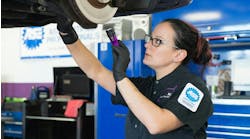To mark the completion of 10 weeks of hard work through the Waukesha County Technical College (WCTC) professional truck driving program, and to celebrate the success of passing both the CDL tests and receiving a passing grade (3.66 GPA), I can close the book on this chapter, and continue to apply all of the knowledge I’ve learned to the development of content for Fleet Maintenance magazine.
The last three months have been a whirlwind of balancing my personal life, continuing to manage my work responsibilities and learning a new skill with the WCTC professional truck driving program.
As I ruminated over the holidays on these last several weeks, I found there were a number of things to acknowledge. Here are a few of those takeaways:
You’re never too old to learn a new skill. Frustration is inevitable, but it's the aftermath of dealing with that frustration that can make or break you. Do you give up, or get back at it? Any skill you attain is done by building a foundation, and adding to that foundation. You need to learn how to walk before you can run. Which means, you need to know how to double-clutch before you can upshift. And you need to know how to upshift before you can downshift. (And, you'd better release those air brakes before you decide to even move that vehicle.)
I had forgotten how much frustration and gratification can go into learning how to do something new. And those skills kept getting compounded. First – learning to double-clutch (on a simulator). Then, doing it in a truck. Learning how to couple and uncouple a fifth wheel. Learning how to complete a pre-trip inspection –including pointing out all components and systems on a vehicle. Learning how to drive with a trailer, and account for off-tracking with turns. Learning how to back a tractor-trailer. When you put it that way, it’s like drinking from a firehose. It also makes me wonder how some of these organizations tout getting Class A commercial drivers licenses in a couple weeks... Sure, you’ll learn to drive forward in a straight line – but you really won’t gain a fundamental understanding of how to operate that vehicle safely on the road.
Stop stereotyping truck drivers. The first day of class, our instructor, Jeff Kiel, asked everyone to look around at the other students. Did anyone in that classroom look like a “stereotypical” truck driver? Absolutely not – at least not what people expect when they think “truck driver." This diverse group of 14 students was a sampling of many more coming into the industry. Our class included students from an 18-year-old recent high school graduate, all the way to a retired police officer. Other backgrounds ranged from factory work and farming to health care or retail (plus, yours truly, in publishing). There were four African-Americans, one Puerto Rican and three women in class (including myself). Not to mention, our class was the first to have that many women enrolled at once.
As classmate and peers, we are on equal footing – all learning the same skills, getting frustrated about the same challenges, and rooting each other on to succeed - placing politics, religion and beliefs aside.
We may have been an exception, but everyone in class got along with one another. Everyone joked around together and encouraged one another. I'm so grateful I had the chance to meet every single person in that class, because they all brought a unique perspective on life and their approach to learning.
I have a newfound respect for professional truck drivers. The responsibilities of a commercial vehicle driver on the road today include working the long hours, operating a heavy duty and complex vehicle, ensuring that vehicle is in good operating condition every time it hits the road; having responsibility for being the face of the industry and communicating the needs and issues to those within the industry. That’s a lot of pressure, and we - as an entire industry, and beyond - need to continue to promote how important this job is not only to others within the industry, but to the motoring public.
But, the amount of freedom you have as a driver is also invigorating. You make it your own. If you’re willing to go out and get it, there’s plenty out there to get. Particularly with the driver shortage, job prospects for graduates of the WCTC program are exceptional.
Each program at WCTC includes a sheet of paper outside the door of that classroom indicating how many job opportunities are available. The sheet outside our door indicated 963 positions – just in southeast Wisconsin – are available currently.
Everyone in the commercial vehicle industry should have a commercial driver’s license. Regardless of which area of the industry you serve, the training I received was critical to understanding the requirements of a driver. Drivers are our industry’s boots on the ground. They are the face of our industry, and they have the responsibility of communicating that both to the public and to other segments of the market.
Not only that, it helped give me a more detailed and thorough understanding of the tractor-trailer itself. In particular, the comprehensive training for pre-trip inspections, and the evaluation process for different skills such as coupling and uncoupling, shifting, turning and backing.
Classroom time was spent understanding hours of service, trip planning, federal DOT regulations, hauling hazardous materials and more.
Overall, it provided me with a complete understanding of what’s required of a professional commercial truck driver in today’s market, setting up all graduating students to enter the workforce directly from school.
Respect and acknowledge your support team. First and foremost, the Fleet Maintenance editorial team is top notch. They helped keep everyday responsibilities and longer term projects on track while I focused my energy on learning how to double-clutch. In addition to that, the entire Vehicle Repair Group team was nothing but supportive and engaged with my progress as I went through the program. And, I'd remiss to not acknowledge my friends and family, who verbalized just how crazy and/or ambitious I was to go back to school.
...
Just before the holidays, I had the opportunity to walk as a graduate of the program, in the WCTC fall graduation ceremony. It was invigorating to see so many wide-eyed and ambitious individuals ready to start their careers, or begin new ones; and an honor to walk with others in my class who also completed the program.
I’m always the student, because I’m constantly learning. Even with these acquired skills and this additional knowledge of the industry, I plan to continue to educate myself through community programs, industry events and more.
In my role, I’m also a teacher, because I have to relay this information to our readers in a mindful and clear way, to share this knowledge with the industry.
I hope that this process, and my sharing of the entire experience with going back to school, has helped educate others on the challenges and benefits of learning a new skill – and one critical to understanding this industry better. It’s certainly helped me to gain a better perspective, and newfound respect, for this critical part of the commercial vehicle industry.
...
In the Driver’s Seat is a blog series from Fleet Maintenance editor-in-chief Erica Schueller. The series covers the process of attending a formalized technical training professional truck driving program in order to obtain a Class commercial vehicle driver’s license.




